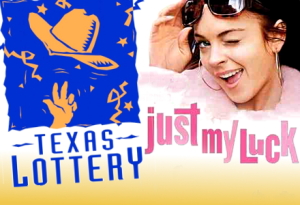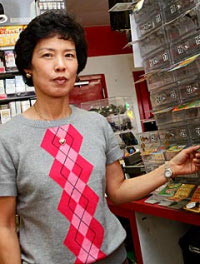 The wire services were recently abuzz with news that the Massachusetts State Lottery game Cash WinFall was being (legally) gamed by, among others, a couple of retirees who’d claimed 1,105 of the 1,605 winning tickets during a particular week in May, and a Massachusetts Institute of Technology grad who cashed more than 500 winning tickets so far this year. As a result of this story, the spotlight has been turned on the integrity of lotteries across the country. In true lottery-luck fashion, the latest issue of Harper’s magazine features a story by Nathaniel Rich titled The Luckiest Woman On Earth.
The wire services were recently abuzz with news that the Massachusetts State Lottery game Cash WinFall was being (legally) gamed by, among others, a couple of retirees who’d claimed 1,105 of the 1,605 winning tickets during a particular week in May, and a Massachusetts Institute of Technology grad who cashed more than 500 winning tickets so far this year. As a result of this story, the spotlight has been turned on the integrity of lotteries across the country. In true lottery-luck fashion, the latest issue of Harper’s magazine features a story by Nathaniel Rich titled The Luckiest Woman On Earth.
The lucky woman in question is Joan Rae Ginther, a 64-year-old born in Bishop, Texas, who now calls Las Vegas home. In 1993, Ginther won $5.4m in a pick-six Lotto Texas game. In 2006, Ginther won $2m on a scratch card game. In 2008, another lucky scratch card earned Ginther $3m. In 2010, Ginther won $10m, also via scratch card. Two of her scratch card winners were purchased in Bishop, while the third was purchased in neighboring Kingsville. Rich queried lottery experts for theories that might explain Ginther’s amazing run, and uncovered a possible scenario that has little to do with luck.
Most high-end scratch card lotteries have a print run of around 3m tickets. The Texas Lottery divides these 3m tickets into six pools. When the first pool is close to selling out, the next pool is released to retailers. There are three grand prizes lurking somewhere amongst those 3m tickets. To ensure that all three jackpots aren’t won early in the run (which would have a negative effect on sales), it’s believed that lotteries hold back at least one, if not two, of these prizes for later pools. In each of Ginther’s scratch card wins, the first grand prize was claimed by someone else during the release of the first pool, while Ginther claimed the second jackpot midway through the print run.
To game the system, you’d first need to identify the algorithm that determines which scratch cards are big winners. This would require access to historical data and a sharp mathematical mind. (The data is available via freedom of information requests from the state-run lottery, while Ginther is a Stanford School of Education grad that co-wrote a pre-algebra textbook.) A successful code-cracker couldn’t conclusively identify a grand prize ticket in advance, but, much like card counting, it allows you to identify when the odds are more likely to be on your side.
Once you knew at what stage of the print run a winner was likely to appear, you’d then need to identify the retail locations where a specific range of tickets was to be shipped. Helpfully, Rich reports that Texas Lottery distributor GTech Holdings “processes its shipments in the same sequence for every order.” By comparing the winning algorithm with the published locations where winners made their purchases, “you could figure out GTech’s normal shipping order, and where [future] winners would be distributed around the state.”
 It would be even more advantageous if you waited until your research told you that a winning ticket was to be shipped to a sparsely populated area (like, say, Bishop, Texas). That would reduce the possibility that someone might buy the winner ahead of you. Of course, if you could convince a local retailer to put all of a particular game’s tickets aside for you (and you alone), that would cut the odds even further. Some Bishop residents told Rich that Ginther had such a deal with Sun Bae (pictured at left), owner of the Times Market where Ginther purchased two of her scratch card multi-million winners.
It would be even more advantageous if you waited until your research told you that a winning ticket was to be shipped to a sparsely populated area (like, say, Bishop, Texas). That would reduce the possibility that someone might buy the winner ahead of you. Of course, if you could convince a local retailer to put all of a particular game’s tickets aside for you (and you alone), that would cut the odds even further. Some Bishop residents told Rich that Ginther had such a deal with Sun Bae (pictured at left), owner of the Times Market where Ginther purchased two of her scratch card multi-million winners.
When Rich paid a visit to Times Market, he found Bae to be an exceedingly reluctant interviewee (almost as publicity shy as Ginther herself). Store employees provided inconsistent stories on Ginther’s ticket-buying habits then stopped answering questions altogether. As Rich was putting his article to bed, he learned that Times Market had abruptly closed down in June. An unnamed Bishop resident told Rich that the Internal Revenue Service had launched an investigation involving Bae and Ginther. The IRS declined to confirm the story.
Of course, Rich stresses that he has no evidence of anything beyond Ginther’s incredible good fortune. But the director of another state’s lottery told Rich that he “could bet on two things. One, [Texas Lottery is] doing a serious investigation. Two, they ain’t going to let anyone find out about it.” That second part might prove more difficult in the wake of the Massachusetts revelations. At any rate, these stories raise an interesting point: will people now start regarding the lottery, much as they do poker, as a game whose outcome depends more on skill than luck?
